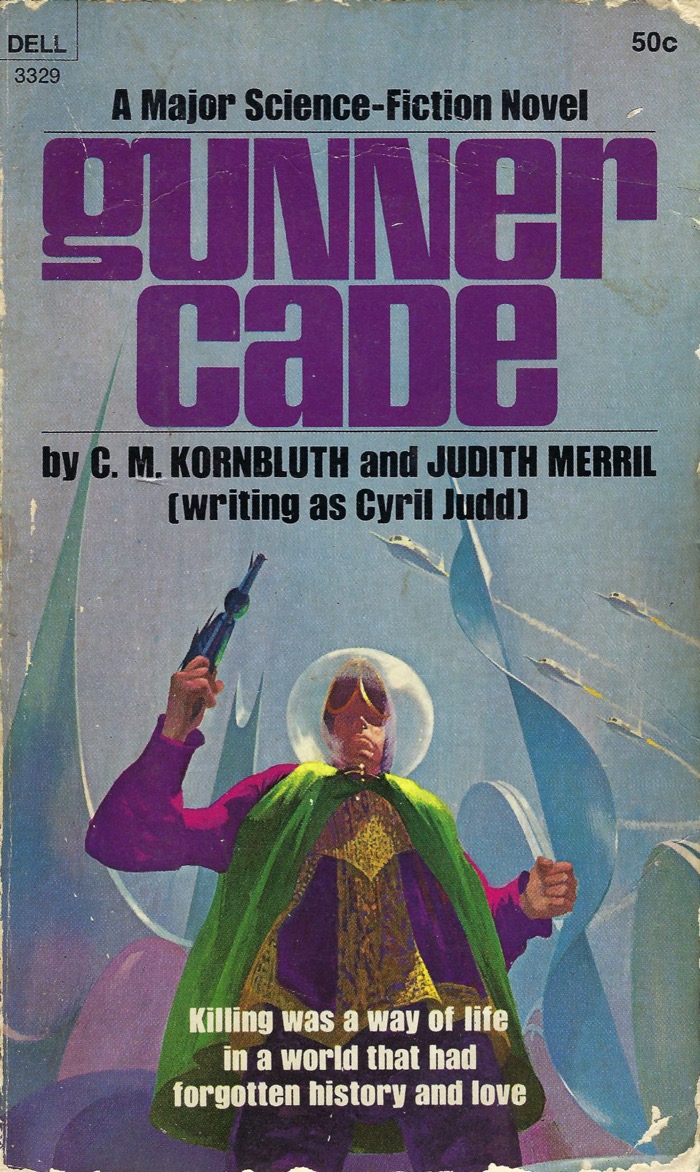Gunner Cade
Reviewed date: 2023 Apr 15
Rating: 3
160 pages
Originally published under the name Cyril Judd
I enjoyed Gunner Cade. It's competently written. It's not great, but it satisfied.
Plot summary
Gunner Cade is an Armsman serving the Star of France. Like all Gunners, Cade lives to fight and to serve the Emperor and his Power Master, according to the dictates of the Klin philosophy. But then Cade gets drugged, kidnapped, shanghaied to Baltimore and hypnotized to participate in a conspiracy against the Power Master. A mysterious woman helps Cade break the hypnosis.
Unfortunately Cade has been erroneously reported as killed in action, so when he tries to report to the nearest Chapter House he is arrested as an imposter. Cade springs himself out of jail, then is forced to spend some time living as a commoner. He comes to an awareness that everything he has been taught is a lie. The Klin philosophy is a sham. The ascetic lifestyle and the regimented, ritualistic code by which the Gunners live and fight is a tool to control them. Those at the top—the Starborn, the Emperor, the Power Master, even the Gunner Supreme himself—live sumptuously and decadently. Cade has been a chump.
It's all rotten at the top. His prior jingoistic existence was in service of a lie. Even the wars he's fought in—they are all machinations designed to keep the powerful in power, the commoners downtrodden, and the Armsmen—like Cade—blindly obedient.
Cade must decide whether to ignore everything he's learned and return to obedient service, or find a way to make new meaning. And of course, because this is a 1950s story, there is a hamfisted love story as well.
Other reviews
George O. Smith in Space Science Fiction, March 1953, page 116 (PDF link courtesy of Luminist Archive): "Here we have a governmental set-up of the flimsiest construction, hastily pasted together with a series of meaningless litanies all concerned with the horrors of some long-forgotten war. ... Cyril Judd can do better. I know they can."
Uncle Geoff at SFcrowsnest: "Elements of the plot are drawn together at the end which, unfortunately, rushes to a somewhat good ending. That might be a fault of the page count requirements, not to mention Americans prefer a happy ending or close to a story. Saying that, the story holds together as a whole with engaging characters with their own motivations."
James Nicoll: "As for the actual story … it moves fast and does not overstay its welcome. … Perhaps the one thing that surprised me on this reread is that the women in this novel actually have agency. Their choices drive the plot."
Will Cardini: "Gunner Cade is a classic one-person-against-the-world SF novel, similar to AE Van Vogt’s hyper-kinetic power fantasies such as Slan or The World of Null-A and Philip K Dick’s paranoid visions such as Flow my Tears the Policeman Said."
Morgan, at Castalia House: "this was a work of science fiction with Trotskyite subtext. The revolt against The System, weapons to the commoners who just wanted to be free, the defeat of professionals by the motivated proletariat, yada, yada, yada. … Frank Herbert’s Dune covers some similar ground so much better. … The world of Gunner Cade is not rich, it is rather gray and depressing. My opinion must be common considering this novel had had only three paperback reprints for being a supposed classic."
The comment about Gunner Cade being a Trotskyite book is a stretch. I didn't detect any particularly communist ideology, and I'm sensitive to that sort of subtext. The elements that Morgan identifies as Trotskyite are elements common to all sorts of revolutions, not just communist ones. None of the other reviewers mentioned Trotskyite or communist ideas.
